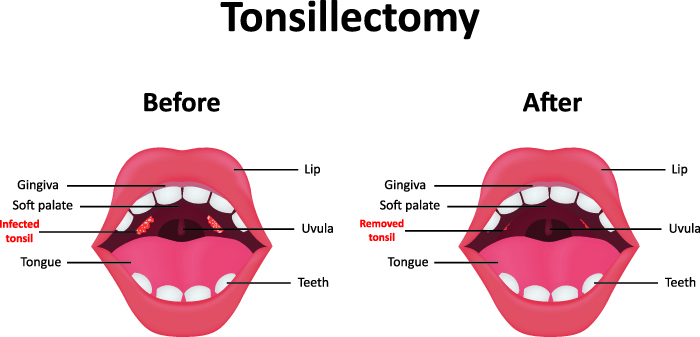Tonsillectomy Surgery in Chembur, Mumbai
Tonsillectomy is a surgical procedure during which an ENT surgeon or an otolaryngologist removes both palatine tonsils from the back of the throat. A tonsillectomy becomes necessary if you have frequent tonsillitis.

What do we need to know about tonsillectomy?
Tonsils are lumpy pads at the back of the throat, one on each side. Tonsils’ primary function is to trap germs you may inhale. Tonsils are soft tissue lumps that are a part of the immune system. Antibodies are proteins made by immune cells in the tonsils.
Tonsillitis is most commonly caused by viruses, but bacterial infections can also cause it. Streptococcus pyrogen, which causes strep throat, is the most common cause of tonsillitis.
Surgeons perform a tonsillectomy for recurrent throat infections and obstructive sleep apnea. Surgeons may recommend tonsil removal if the tonsils are large and inflamed and causing sleeping problems. A tonsillectomy is a scheduled surgery and not an emergency one. Surgeons perform most tonsillectomies as a same-day procedure at a hospital, but sometimes, you may need to stay overnight.
To seek treatment, you can search online for an ENT specialist near you or an ENT hospital near you.
What are the types of tonsillectomies?
- Traditional tonsillectomy: Surgeons remove tonsils.
- Intracapsular tonsillectomy: A surgeon extracts the affected tonsil tissue but leaves a minute layer to protect the throat muscles underneath.
Why is tonsillectomy performed?
- Enlarged tonsils and difficulty in breathing at night: Swollen tonsils can cause snoring and obstructive sleep apnea, a condition in which you stop breathing for short periods while sleeping.
- Frequent infections: Tonsillitis occurs over 4 to 5 times a year.
When do you need to see a doctor?
If there is recurring tonsillitis and sleep apnea, consult a doctor.
You can request an appointment at Apollo Spectra Hospitals, Chembur, Mumbai.
Call 1860 500 2244 to book an appointment.
What are the potential risks of tonsillectomy?
Tonsillectomy risks are uncommon, but when they occur, they can include:
- Bleeding can be severe and can last for up to 14 days after surgery
- Dehydration
- Long-term discomfort
- Bacterial Infection may occur
What happens during tonsillectomy surgery?
Surgeons perform tonsillectomy in several ways, and they start the procedure under general anesthesia. It will take 20 to 30 minutes to complete the surgery. Doctors remove all the tonsils, but some patients may benefit from a partial tonsillectomy.
- A surgeon will use a suitable technique that is best for a particular patient.
- Electrocautery burns away tonsil tissue. Electrocautery also helps reduce blood loss by cauterizing the blood vessels, which seal them shut.
- Laser is used to destroy and remove tonsil tissue in laser tonsil ablation.
- A rotary shaving device connected to suction reduces the size of the tonsils in a microdebrider.
- Radiofrequency energy kills affected tissue during radiofrequency ablation procedures.
- The most common tonsillectomy procedure involves removing the tonsils with a scalpel.
What happens after a tonsillectomy?
- Pain is standard after surgery, and it can get worse 3 to 4 days later. Medications will be prescribed.
- You may come across discoloration after the procedure. However, after the healing process for about 3 to 4 weeks, the discoloration goes away.
- You should plan on resting at home for at least a week after tonsillectomy and limit your activity for 2 weeks.
- The risk of bleeding after a tonsillectomy goes away after 10 days.
Conclusion
A tonsillectomy is a clinical operation that removes both palatine tonsils from the back of the throat. If you have tonsillitis or obstructive sleep apnea, it may be necessary. It is a routine procedure, not an emergency one.
Tonsillectomy is a surgery that, in most cases, causes mild-to-moderate pain, with only a few patients reporting severe pain.
If any of the following symptoms occur after a tonsillectomy, contact your doctor:
- Red blood from your mouth
- A high temperature
- Pain that is out of control
- Dehydration
Recommended items include:
- Liquid diet
- A scoop of ice cream and cold juices
- Yogurt
- Soft eggs
Symptoms
Our Doctors
DR. RINAL MODI
BDS...
| Experience | : | 8 Yeras Experience |
|---|---|---|
| Speciality | : | Dental and Maxillofa... | Location | : | Tardeo |
| Timings | : | Mon - Sat : 10:00 AM... |
DR. DIPAK DESAI
MBBS, MS, DORL...
| Experience | : | 21 Yeras Experience |
|---|---|---|
| Speciality | : | ENT, Head and Neck S... | Location | : | Tardeo |
| Timings | : | Available by prior a... |
DR. KEYUR SHETH
DNB (Med), DNB (Gast...
| Experience | : | 7 Yeras Experience |
|---|---|---|
| Speciality | : | General Surgery & Ga... | Location | : | Chembur |
| Timings | : | Mon to Fri : 2:00 PM... |
DR. MEENA GAIKWAD
MBBS, MS (ENT)...
| Experience | : | 8 Yeras Experience |
|---|---|---|
| Speciality | : | ENT, Head and Neck S... | Location | : | Chembur |
| Timings | : | Mon - Sat : 6:30 PM ... |
DR. SHASHIKANT MHASHAL
MBBS, MS (ENT)...
| Experience | : | 22 Yeras Experience |
|---|---|---|
| Speciality | : | ENT, Head and Neck S... | Location | : | Chembur |
| Timings | : | Friday : 8:00 PM to ... |
DR. GANGA KUDVA
MBBS, MS (ENT) , DNB...
| Experience | : | 12 Yeras Experience |
|---|---|---|
| Speciality | : | ENT, Head and Neck S... | Location | : | Tardeo |
| Timings | : | Available by prior a... |
DR. JAYESH RANAWAT
MBBS, MS, DNB, FCPS...
| Experience | : | 16 Yeras Experience |
|---|---|---|
| Speciality | : | ENT, Head and Neck S... | Location | : | Tardeo |
| Timings | : | Available by prior a... |
DR. MITUL BHATT
MBBS, MS (ENT), DNB ...
| Experience | : | 12 Yeras Experience |
|---|---|---|
| Speciality | : | ENT, Head and Neck S... | Location | : | Tardeo |
| Timings | : | Mon - Sat : 2:30 PM ... |
DR. NINAD SHARAD MULEY
BDS, MDS...
| Experience | : | 9 Yeras Experience |
|---|---|---|
| Speciality | : | Dental and Maxillofa... | Location | : | Chembur |
| Timings | : | Mon - Sat : 9:00 AM ... |
DR. ANKIT JAIN
MBBS, MS (ENT)...
| Experience | : | 14 Yeras Experience |
|---|---|---|
| Speciality | : | ENT, Head and Neck S... | Location | : | Tardeo |
| Timings | : | Mon, Wed, Fri : 4:00... |
DR. PRASHANT KEWLE
MS (ENT), DORL...
| Experience | : | 17 Yeras Experience |
|---|---|---|
| Speciality | : | ENT, Head and Neck S... | Location | : | Chembur |
| Timings | : | Mon - Sat : 4:00 PM ... |
DR. SHRUTI SHARMA
MBBS,MS(ENT)...
| Experience | : | 15 Yeras Experience |
|---|---|---|
| Speciality | : | ENT, Head and Neck S... | Location | : | Tardeo |
| Timings | : | "Mon - Fri : 11:00 A... |
DR. ROSHNI NAMBIAR
MBBS, DNB (ENT)...
| Experience | : | 19 Yeras Experience |
|---|---|---|
| Speciality | : | ENT, Head and Neck S... | Location | : | Chembur |
| Timings | : | Mon - Sat : 12:30 PM... |
DR. YASH DEVCKAR
MBBS, MS (ENT)...
| Experience | : | 11 Yeras Experience |
|---|---|---|
| Speciality | : | ENT, Head and Neck S... | Location | : | Chembur |
| Timings | : | Mon - Sat : 9:30 AM ... |
DR. SURBHI P. BHAGAT
MBBS, MD - Anaesthes...
| Experience | : | 21 Yeras Experience |
|---|---|---|
| Speciality | : | Pain Management... | Location | : | Tardeo |
| Timings | : | Mon to Sat : 01:00 P... |
DR. AVNEET SAINI
MBBS, MD, FIAPM...
| Experience | : | 4 Yeras Experience |
|---|---|---|
| Speciality | : | Pain Management... | Location | : | Tardeo |
| Timings | : | Mon to Sat : 1:00 PM... |
DR. SUKHDEO SATYANARAYAN GUPTA
MBBS, DA, DNB (Anaes...
| Experience | : | 6 Yeras Experience |
|---|---|---|
| Speciality | : | Pain Management... | Location | : | Tardeo |
| Timings | : | Mon to Sat : 1:00 PM... |
Our Top Specialities
NOTICE BOARD
CONTACT US
CONTACT US
 Book Appointment
Book Appointment










.jpg)








.svg)
.svg)
.svg)
.svg)








